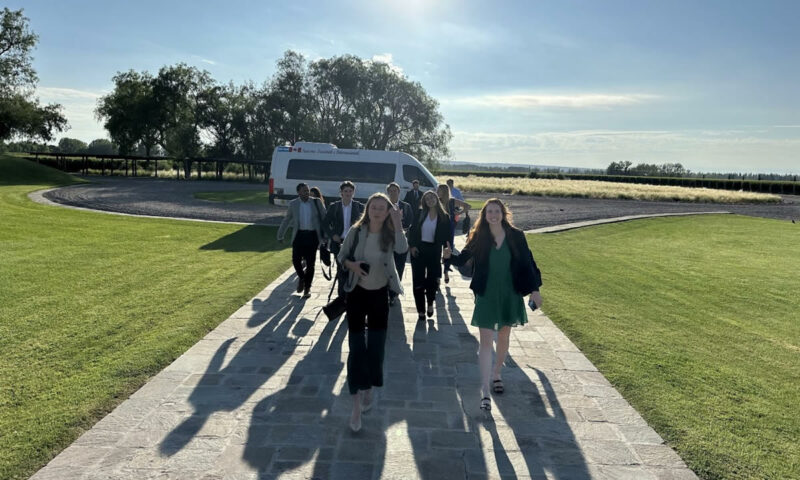For many, teaching is squarely focused on the student experience—deciding what content we are trying to impart, choosing course objectives, and preparing students for the next class in a sequence of scaffold learning, among other concerns. These were largely what I focused on as I entered the classroom for the first time at McIntire this past spring. I team-taught COMM 1800, the Introduction to Business course that undergraduates who are interested in applying to Commerce take. This is a large course, with over 500 students.
You are probably wondering how I taught 500 students in the middle of a pandemic on Zoom?
Well, the spring semester class was an experiment led by Professor Ryan Wright that brought together five faculty to each take a few weeks to teach a general business topic. The course was structured to maximize student engagement. The course met twice a week, and classroom time consisted of 15-20 minutes in a common Zoom room, with time for small groups of four to five students and medium-sized groups of 30 students led by a fourth-year student, who served as a discussion moderator. This structure allowed students to engage deeply with the material and build relationships within their small groups, amplify their learning with their discussion group, and receive insight and mentoring from their discussion leader. We utilized Blackboard, our learning management system, as well as Discord, an instant messaging and digital distribution platform that supports virtual community building through voice and video calls, private chats, grouping, and more.
The theme that we focused on was to intersect the topical area we taught on with the University’s vision to be both Great and Good, or as we have rebranded this concept for McIntire, Commerce for the Common Good. I kicked off the semester teaching leadership: how to be a leader who is both great and good.
The class focused on five core competencies and four values that transformational leaders share. We ended our time together talking about failure, focusing on Brene Brown’s research on recovering from failure, which is documented in her book Rising Strong. For those of you who are familiar with Brown’s work, you know that she often talks about vulnerability and the importance of being willing to fail. I see this concept as a willingness to take the irreversible leap—that final step off a blind cliff when you are in mid-air, hoping that it all works out. In reality, sometimes you fly, and sometimes you faceplant into the canyon floor. Regardless of the outcome, embracing failure means being relentless in taking that irreversible leap with expectations of wild success. And it is the only way that I know to find the path less traveled—a discovery that can make all the difference.
Brene Brown frequently quotes something Teddy Roosevelt noted in 1910:
“It is not the critic who counts; not the man who points out how the strong man stumbles, or where the doer of deeds could have done them better. The credit belongs to the man who is actually in the arena, whose face is marred by dust and sweat and blood; who strives valiantly; who errs, who comes short again and again, because there is no effort without error and shortcoming; but who does actually strive to do the deeds; who knows great enthusiasms, the great devotions; who spends himself in a worthy cause; who at the best knows in the end the triumph of high achievement, and who at the worst, if he fails, at least fails while daring greatly.”
After teaching undergraduates for more than 20 years, I don’t think much about failing in the educational space. However, every time you enter a classroom—especially a virtual one—failure is always a possibility. You can prepare, prepare, prepare and still have a class go horribly wrong. My preparation to teach COMM 1800 was laborious. I checked my plan with several longtime faculty of the school; read and reread the research that I was pulling from; and tested my small group activities with my 17-year-old daughter, a friend who is an executive coach, my therapist husband, basically anyone who would listen. At the end of the day, I had to decide what content, experience, homework, and group projects were in or out.
The first day, my stomach was full of butterflies, like it is on every first day. Did I prepare enough? Is the timing going to work? Will the students find this interesting? All these questions swirled in my mind as I took that irreversible leap into the classroom.
I tried to make the experience for the students a memorable one that would make them want to learn more about Commerce and decide to join us as third-years or as graduate students. I don’t quite know the answers to all of those Day One questions that I asked myself. But what I discovered again is an outcome that always surprises me after I have taught: I went into the semester wanting to impart knowledge to students, and yet, every day, found myself learning from them. Many think of teaching as an undertaking that only goes in a single direction, but if you are invested and doing it right, it is a collaborative process that results in mutual growth and enjoyment.
Once the butterflies were long gone and the semester was finished, I can say that I wholeheartedly loved my first teaching experience at McIntire, and as we step into a brand new semester, I look forward to many more.
Special thanks to the Class of 2024 on a most memorable first Comm School classroom experience.



